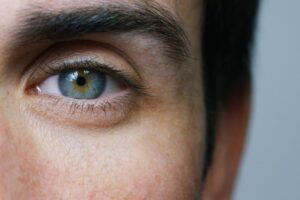Where does consciousness come from?
Where does consciousness come from?
In this weekly comment, Timo Pieters argues that the cause of consciousness cannot be brain activity, but must be a previous stream of consciousness.
This weekly comment was written by Timo Pieters and reflects his personal analyses and opinions, rather than those of EARS.
The hard problem of consciousness
For thousands of years, our fellow humans have debated the question of what consciousness is, where it comes from, and where it will go after death. Today the debate is still very active in fields like the philosophy of mind and neuroscience.[1] Many have tried to answer these questions by referring to religious scripture or dogma, while others have tried to use reasoning and logic to find the answer.[2]
The Buddhist philosopher Dharmakirti
Someone who has tried to solve the problem through reason was the 8th-century Buddhist philosopher Dharmakirti, who taught at Nalanda University in India; one of the oldest universities in the world.[3] He would often debate the ‘materialists’ (Sanskrit: Charvakas) of his day, who expressed similar views to current-day materialists.[4] They believed that consciousness was caused by the physical elements of the body, and that when the body dies, consciousness would simply vanish. Dharmakirti thought this was illogical.[5]
Rather than trying to explain his reasoning in detail, I will demonstrate his key arguments by trying to answer a simple question: where does the first moment of consciousness in a human fetus come from?[6] There must, after all, be a first moment when a fetus starts experiencing something, whether at the moment of conception or after a few days or weeks of gestation.
Could the fertilised egg be the cause of consciousness?
If the fertilised egg itself were the direct cause of the first moment of consciousness, then it would transform into its result, and therefore the fertilised egg would cease to exist as soon as consciousness came into being. After all, the direct cause of something is the thing that turns into its result, such as a sprout turning into a tree. Once the tree is there, the sprout no longer exists.
Also, if the fertilised egg were the cause of consciousness, then consciousness would have to have similar properties to a fertilised egg. But, clearly consciousness does not divide, multiply, or grow in size, like an egg.
Could the sensory systems of the body be the cause of consciousness?
Another option is that the sensory systems of the body are the cause of consciousness. By sensory systems I am referring to the sense organs and their corresponding nervous systems, such as the visual system. This option opens up two possibilities. Either all the sensory systems together act as the cause, or only one of them does. If all the sensory systems (visual, auditory, etc.) together acted as the cause, then consciousness could not arise if one of the systems were missing or impaired, such as in people who are born blind or deaf. Clearly blind people are conscious, so this option is impossible.
However, if only one sensory system were the cause of the first moment of consciousness, then consciousness would have the nature of that sensory system, and could therefore only perceive one kind of object, such as only sights or sounds. Otherwise, where would consciousness suddenly gain the capacity to perceive things like thoughts and emotions, if its cause were the visual system, which can only perceive sights?
Could brain activity be the cause of consciousness?
Now we are getting to the most commonly held view in the modern West, which is that brain activity causes consciousness. The first thing to point out is that brain activity consists of two very simple things: (1) electricity and (2) neurotransmitters, which we can summarise as ‘electrochemical signals’.[7] [8] That is it. There is nothing magical about brain activity.
So, if the first electrochemical signal in the brain of the fetus were the cause of the first moment of consciousness, then that consciousness would have to have a similar nature to that signal. In other words, it would have to have properties that are very similar to those of electricity or neurotransmitters. After all, everything else in nature works this way. A seed, a sprout, and a tree all have physical properties like mass, volume, a specific location, and they are largely made of the same chemical substances.
The properties of consciousness
However, when we observe consciousness, we can see that it does not possess any physical properties whatsoever, such as mass, volume, or a definite location. In fact, consciousness and electrochemical signals do not have any properties in common, so how could they cause each other? From where would consciousness suddenly gain the subjective (‘phenomenological’) properties that it has?
Let us imagine that the first experience of the unborn fetus is that it sees the red colour on the inside of its eyelids. The standard explanation is that photons strike the retina, which translates this into electrochemical signals. These signals are then sent through the thalamus to the visual cortex, which translates the signals into an appearance of redness.[9] However, neither the electrical currents, the neurotransmitters, nor the neurons in the visual cortex possess the qualitative property of redness, so where does this property suddenly come from?
Absurd consequences
Now, even if individual electrochemical signals in the brain could cause consciousness, then each signal would give rise to a mental event (an experience), which would have the absurd consequence that one’s experiences would be unrelated to each other. The causal connection would be between an electrochemical signal and a moment of consciousness, but not between the successive moments of consciousness. Coherent thought and reasoning would be impossible.
Could a previous moment of consciousness be the cause?
Finally, Dharmakirti considered the possibility that a previous moment of consciousness might be the cause of the first moment of consciousness in an unborn fetus. The reason this would be a good answer is because consciousness would be caused by something that has a similar nature and similar properties to itself. Now, if this is true, then each moment of consciousness is the result of a previous moment of consciousness, going back infinitely throughout time. It would follow that each moment of consciousness would also act as a cause for a next moment.
Continuity of consciousness
Therefore, Dharmakirti comes to the conclusion that consciousness is a beginningless stream or continuum that goes on forever. The Buddhist view of rebirth is precisely this: a continuous stream of consciousness that moves from one embodiment to the next.
Interestingly enough, this view is supported by a voluminous body of empirical research, such as studies about past-life memories in childhood, near-death experiences, and unexplainable psychophysiological influences. This research was performed at the University of Virginia, Division of Perceptual Studies (DOPS).[10] At the very least, the continuity of consciousness is a possibility that cannot be dismissed out of hand.
This weekly comment was written by Timo Pieters and reflects his personal analyses and opinions, rather than those of EARS.
Interested in similar topics? Go to our Dashboard and receive free updates.
[1] For some authors, see: Donald Hoffman, Thomas Nagel (Mind & Cosmos), Max Velmans.
[2] Most of the monotheistic traditions (Christianity, Judaism, Islam) claim that consciousness (the soul) was created by God, based on scriptural claims.
[3] Hartmut Scharfe, Education in Ancient India. Handbook of Oriental Studies. Section Two, India = Handbuch Der Orientalistik. Indien, V. 16. (Leiden: Brill 2002), p. 149.
[4] Eli Franco, Dharmakirti on Compassion and Rebirth, (Wien: Arbeitskreis für Tibetische und Buddhistische Studien Universität Wien, 1997), p. 5.
[5] Tom J.F. Tillemans, “On Minds, Dharmakirti, and Madhyamaka.” p. 2
[6] For those who wish to explore the argumentation in detail, please consult the ‘discussion’ section of: Dharmakirti and Thomas Nagel on the Origin of Mental Activity (BA Thesis), p. 28.
[7] Action potentials and synapses – Queensland Brain Institute.
[8] What are neurotransmitters? – Queensland Brain Institute.
[9] Visual perception – Queensland Brain Institute.
[10] Kelly, Edward F., Kelly, Emily W., Crabtree, Adam., Gauld, Alan., Grosso., Michael., Greyson,
Bruce. Irreducible Mind : Toward a Psychology for the 21st Century (Rowman and Littlefield
Publishers, 2009).






